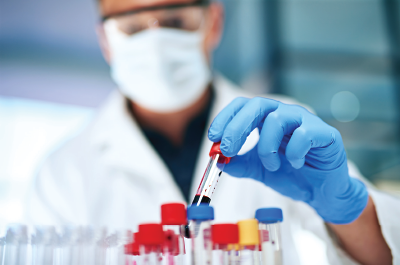Researchers have looked at numerous ways to increase the odds of selecting the most effective antidepressant for each patient by searching for clues in genes, brain scans, and blood samples. That last one—blood—is one of the most intriguing, given that drawing and analyzing blood is an easy process that is already a routine part of health care. But for the many depression investigators looking for clues in the bloodstream, the process has also been frustrating, filled with false starts and dead ends.
“Why have blood biomarkers been difficult to find? The short answer is, Who knows?” said Madhukar Trivedi, M.D., the Betty Jo Hay Distinguished Chair in Mental Health and Julie K. Hersh Chair for Depression Research and Clinical Care at the University of Texas Southwestern Medical Center.
“Experiments may not have used the right study design or asked the right questions in the right population,” he said, echoing the right-drug, right-person, right-time mantra of precision medicine.
Trivedi continued by explaining that the levels of proteins or metabolites in the blood are quite fluid and can change depending on time of day or consumption of the last meal. In addition, many blood proteins have a wide range that is considered “normal,” which makes finding cutoffs between a drug respondent and nonrespondent difficult.
“This is not limited to depression,” Trivedi told Psychiatric News. “Biomarker development and validation have been elusive in many chronic medical conditions, such as cancer or Alzheimer’s.”
Still, the tremendous potential benefits of improved patient outcomes and lower treatment costs motivate researchers like Trivedi and Carmine Pariante, Ph.D., a professor of biological psychiatry at Kings College London.
Pariante has long been interested in the links between depression and inflammation. His research has shown that many depressed patients have higher levels of inflammation, and those with treatment-resistant depression have even higher inflammation still.
“We think that the inflammation acts at the level of the brain and disrupts monaminergic signals; that is, neurotransmission by chemicals like dopamine, serotonin, and glutamate,” he said. Since most antidepressants affect monoamine signaling, this disruption would explain the correlation between inflammation and drug resistance.
It also suggests that inflammatory biomarkers are a promising avenue to pursue.
Pariante’s lab has focused on cytokines, which are chemicals released by white blood cells that trigger immune responses and subsequent inflammation. It’s been a daunting effort, as there are over 100 cytokines produced by the immune system, but Pariante has identified two that were consistently elevated in people with treatment-resistant depression: macrophage migration inhibitory factor (MIF) and interleukin-1β (IL1β).
Pariante has developed an assay that measures the expression of these cytokines in the blood and found it can be predictive at the extremes; that is, patients with very high or very low levels of both these chemicals can be accurately classified as an antidepressant nonrespondent or respondent, respectively. In fact, though he has assessed only a small sample of patients so far (approximately 150), this test has been 100 percent accurate at the highest and lowest cutoffs.
That’s an impressive statistic, but Pariante cautioned that the markers have limitations in their utility. For one, around 40 percent of the people he has tested had cytokines in an intermediate range where no prediction could be made. As for those patients with adequate readings, the test can classify them only as likely to respond or not respond to an antidepressant. The test cannot predict the degree of improvement expected from a certain medication or which medication is the best choice.
“I believe this test could still be valuable in clinics if it’s used in the right context,” he told Psychiatric News. “If we use the test to find patients with high cytokine values, we can proactively start them on an aggressive strategy that combines medications or employs adjuncts to reduce inflammation levels.”
As part of his research program, Trivedi has been exploring another promising immune-associated biomarker—C-reactive protein (CRP). Unlike cytokines, this protein is not an immune-activator; rather, it is produced by the liver in response to inflammation. However, as a potential biomarker, CRP is attractive since it is very stable and easy to measure—reasons why it is already used as a biomarker to assess heart disease and stroke risk.
Early efforts at establishing CRP as a biomarker for depression, however, had inconsistent results. But Trivedi suspected that those studies might have been using too high a threshold—typically around 5 mg/L of CRP, which constitutes a highly inflamed state.
Making use of data from one of his large clinical studies (the CO-MED trial, which compared the SSRI escitalopram either alone or with bupropion), Trivedi tested a more modest cutoff of 1 mg/L. He found that people with CRP levels below 1 mg/L responded better to escitalopram, while people with levels above 1 mg/L responded better to the combined therapy.
The predictive value was more modest than Pariante’s assay; the overall remission rate in the CO-MED study was around 41 percent, and if the patients had been pre-screened based on their CRP levels, the success rate would have jumped to approximately 53 percent. However, considering the low cost and ease of testing, Trivedi sees no reason that CRP—or other blood biomarkers with some degree of evidence—shouldn’t be a component of a multimodal therapeutic strategy.
Trivedi believes that psychiatry suffers from a perception that diagnostic tests need to be near-perfect to overcome the trial-and-error of conventional diagnosis. As a counterpoint, he cited high blood pressure, another condition for which there are a number of possible pharmacological treatments but no firm front runner. “If someone said a simple test could improve the odds of picking the right hypertensive by 20 percent, it would be called a breakthrough.” ■

